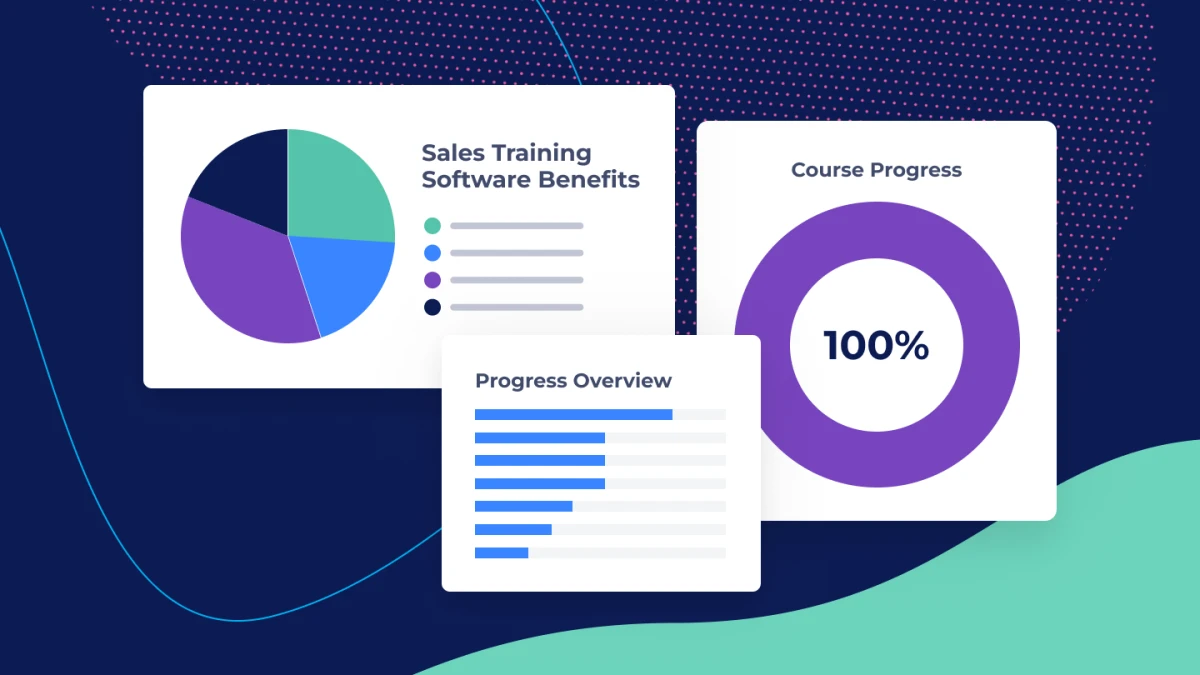Empowering your sales reps with the right skills is crucial for driving sales enablement. But simply equipping your reps with the latest laptops and CRM software isn't enough. To truly empower them, you need to equip them with the right skills and knowledge, a process facilitated by effective sales enablement. One crucial tool in achieving this is sales training software. However, the question remains: how do you measure the impact of your investment in this software and ensure it's delivering a tangible return on investment (ROI)?
This blog dives into training programs and sales software, equipping you to measure the impact of your training not just on your sales team, but on your entire organization. In short, you'll learn how to quantify the value of your training initiatives and enhance your sales training strategies.
What is sales training software?
Sales training software is a tool that helps businesses train and improve the skills of their sales teams. Many companies use this learning platform to teach sales reps about products, sales techniques, and customer service.

How to measure the effectiveness of your online sales training
1. Establish clear objectives for your sales training program
Before explaining the process of measuring ROI for your sales training software, it's important to define clear objectives tied to your training program. These objectives will serve as a basis for determining the success of your online sales training software. Some common goals for sales training initiatives include:
- Generate new sales
- Increase sales revenue and profitability
- Improve sales cycle efficiency
- Enhance customer satisfaction and retention
- Elevate sales managers’ and team members’ sales skills and product knowledge
With these objectives in mind, you can develop key performance indicators (KPIs) that will help you to effectively measure the ROI of your sales training software investment. And while setting clear goals is key, it's even more crucial to understand how those goals contribute to the overall success of your business. This connection is what ties goals to business outcomes.
2. Track key performance indicators (KPIs)
To quantify the impact of your sales training platform, consider tracking the KPIs listed. Numbers like this provide insights into the effectiveness of your initiatives.
- Revenue growth: Track revenue increases from your sales team, comparing pre- and post-training data to gauge the impact of your training software on your bottom line. This metric can be further broken down into individual product lines, territories, or sales team segments.
- Sales cycle reduction: An efficient sales cycle is crucial for organizations to close deals faster and improve resource allocation. Measure the length of your sales cycle before and after implementing your sales training platform. With your sales cycle quantified you can better evaluate how your software is streamlining the training process and accelerating decision-making.
- Customer satisfaction: High customer satisfaction is directly correlated with customer retention. According to Hubspot, only a 5% increase in customer retention can increase company revenue by 25-95%. Use customer feedback surveys, net promoter scores, and customer churn rates to analyze improvements in customer satisfaction and loyalty.
- Sales team skill development: Assess the evolution of your entire team's skills and their ability to meet set targets by tracking overall performance metrics such as quota attainment, close rates, and average deal size.
3. Demonstrate the return on investment (ROI)
By analyzing the collected KPI data, you can demonstrate the ROI of your online sales training program. ROI measures the financial benefit of your investment. While there's a formula to calculate ROI (net profit divided by investment), the key is to show a positive correlation between your training program and improved business outcomes.
For instance, if your training leads to a significant increase in revenue that outweighs the program's cost, that's a strong indicator of positive ROI. You can present this data in reports to highlight the program's effectiveness and its value to the organization.
Remember, measuring the effectiveness of your online sales training goes beyond just numbers. Positive feedback from team members, increased confidence in sales calls, and improved customer relationships are all valuable signs of a successful program.
Optimizing sales training strategies based on ROI insights
With your ROI insights handy, you can optimize your sales training strategies to increase the return on your sales training software investment. Some actions to consider include refining sales content, targeting skills gaps, performing assessments, and widening your training scope. Let’s go into each of these more in-depth.
Refining sales content
Use data on your sales team's engagement with training materials to identify which content resonates best and adjust your training materials accordingly.
- Identify high-performing and low-performing content: Sales training courses with high engagement and positive feedback likely resonate well with your team, while low-performing courses might require adjustments.
- Promote continuous feedback and improvement: Encourage your sales team to provide feedback on the sales content through surveys, focus groups, or open-ended discussions.
FYI: Absorb Create allows you to edit sales content and publish quality courses in minutes using generative AI.
Targeting skill gaps
Based on the sales team's performance data, identify specific skill gaps that can be addressed in future training sessions for maximum impact.
- Prioritize high-impact skills: Don't try to address everything at once. Focus your training courses on the skills that have the most significant impact on your sales cycle and overall revenue generation.
- Tailor training to address gaps: Consider incorporating different learning formats, like simulations, role-playing exercises, or personalized coaching, to cater to individual learning styles and preferences.

Read how Litmus supported sales teams’ skills with Absorb LMS.
Ongoing assessments
Continuously track progress and reevaluate your KPIs to ensure your sales training software remains aligned with your organization's strategic objectives.
- Use pre-training assessments: Before launching new training modules, conduct pre-assessments to gauge your team's existing knowledge and identify any foundational gaps that could hinder learning effectiveness.
- Encourage self-assessments: Encourage your sales team to engage in self-reflection and self-assessment through journaling prompts, personal scorecards, or goal-setting exercises. This empowers them to take ownership of their learning journey and identify areas for continuous improvement.
Expanding training scope
Consider leveraging your sales training software beyond the sales team, offering training opportunities to various departments within your organization.
- Onboarding and development: Use your online sales training software to streamline the onboarding process for new reps across departments. Provide them with company training content, product knowledge, and role-specific skills, speeding up their time-to-productivity.
- Soft skills development: Invest in the overall professional development of your workforce by offering training on soft skills like communication, collaboration, problem-solving, and time management. These skills are valuable across departments and contribute to a more efficient, cohesive, and productive work environment.
By effectively measuring the ROI of your sales training software, you can make strategic adjustments to your training initiatives, ensuring that your investment continues to deliver optimal results for your organization.
Read the blog: Closing deals with confidence: Sales training best practices in LMS
Meet your new sales training tool
Measuring the ROI of your sales training software is a crucial step in ensuring that your investment is delivering tangible results for your organization's bottom line. By quantifying the impact of your sales training and taking steps to optimize your training program, you're well on your way to leading a successful sales team.
Looking for a partner to support your sales training initiatives? Absorb is a cloud-based LMS software designed to inspire learning and fuel business productivity. Plus, it’s an optimal software platform to train sales reps. With our robust LMS platform, we help organizations deliver engaging and impactful training experiences to sales professionals. Schedule a demo to learn more.





